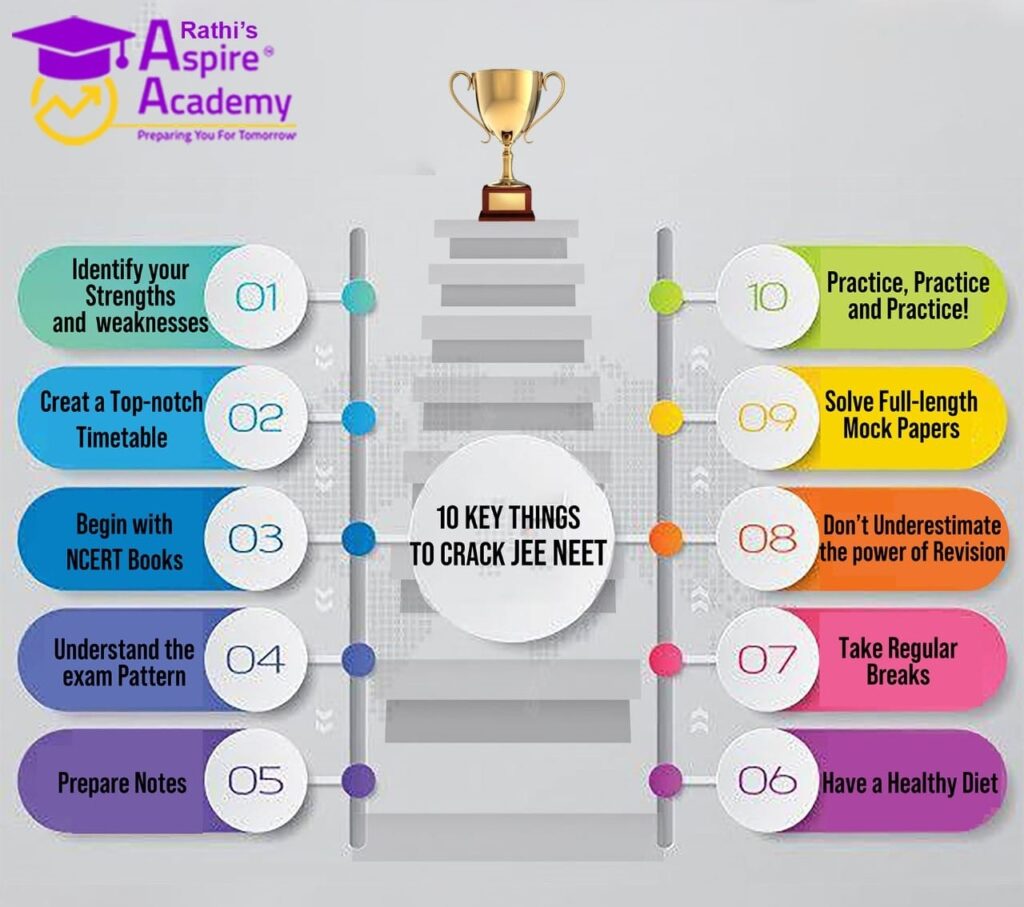Important Tips for IIT-JEE Preparation

“Success is the sum of small efforts, repeated day in and day out”
Success in life can only be achieved by consistency,practicing and being focused on your goal. It is basically going through failure without losing enthusiasm. We believe every student has its own identity, hobbies and intelligence, but it only needs to be moulded a little to perform better
As a JEE Main 2022 aspirant, you must be working round-the-clock to achieve your goal of passing the national engineering entrance exam in order to gain admission to prestigious institutions like the IIT, NIT, JEE.
In this blog you will find :-
- Preparation tips for IIT-JEE
- Chapter wise important topics.
- Marking system(Mathematics, Physics, Chemistry).
- How to study for subjects accordingly.
Let us tell you one short experience of Siddhant about the exam which will inspire you!
Siddhant Jakhotiya ( JEE Advanced 2022 ) – AIR 168. According to Siddhant, he was always a studious kid, but he started JEE preparation a little late compared to his classmates. However, he followed the perfect timetable which was given and he practiced a lot. Along with learning in a coaching center and doing homework, he also did a lot of self-study, and followed the tips given in class strictly. He also mentioned that he studied all 3 subjects every day and thoroughly. His consistency and practice made him qualified for IIT. He says- if i can do it, you can do it too!!
Get ready to achieve your success by following these instructions..
Important tips for preparation of IIT-JEE

The majority of students begin their JEE Main preparation in class 11, however if a student is committed to passing the test, it’s never too late. According to experts, candidates for the JEE Main exam should begin studying as soon as feasible. For instance, studying concurrently with the board exams is a good strategy. As a result, the candidate will have an advantage over challenge and be better able to comprehend subjects when they are presented in college. However, many people succeed on the exam after only a short period of study. As a result, it also depends on the candidate’s aptitude, commitment, and degree of planning. The first thought that comes to an aspirant’s mind while creating a preparation strategy is: Which is more important—how much to study or for how long? None of them, in all honesty, unless they are proficient students. Before they start, it is much preferable to comprehend and create a clear concept. The next stage after learning how to study is to concentrate on how much of the syllabus can be covered in a given amount of time.
Maintain Your Strengths
Choosing new topics that they haven’t previously studied is a common error that students make during the last phase of their JEE preparation. The final preparation will inevitably be hampered if this is done. To enhance preparation, one should also pay closer attention to fundamental ideas and go through key formulae and theories again. In order to identify the topics in which they are lacking, students should also keep in mind to review their preparation during this time. They shouldn’t, however, spend too much time on any one subject.
Solving practice papers is the greatest strategy to review for JEE Main in the last week. Students can assess their preparation via JEE mock exams, which show their preparation’s strengths and deficiencies.
Since the JEE test pattern changed in 2020, students must find pertinent practice sets to become accustomed to the new format. In order to learn from their errors, individuals should also strive to solve as many of these practice papers as they can. Students can first disregard concerns about time and concentrate on providing accurate answers as there is negative marking. Students can concentrate on finishing the paper in the allowed time once they have been acquainted with the exam format and variety of questions.
Split the days
At this critical time when consistency counts, it is fitting to capitalize on your time. You ought to in this manner partition your days subject wise. Get the subject you are strong in first as it you’ll have the option to rapidly go through it saving time for other subjects. You can isolate the days at your only caution as per what suits you the best. It shouldn’t really be isolated consistently.
Let’s go through subject-wise important topics from your chapter which you can go through and refer to.
Mathematics
Mathematics: 25 (20+10) 10 Questions with answers as a numerical value. Out of 10 questions, 5 questions are compulsory.
MARKS-100
- Recognize the formulae and memorise them.
- Keep in mind how to solve difficulties.
- Try to answer a few questions from each topic, particularly the challenging ones.
- Find out which chapters are crucial, then practice as many of the problems in those chapters as you can.
- Keep track of the time as you work through the issues to enable quick and precise calculation. Avoid using calculators when solving the problems; instead, use your hands.
| TOPIC | IMPORTANT POINTS |
| 1) Sets, Relations, Functions | Types, Operations, Function of set |
| 2) Complex Numbers & Quadratic Equations | Quadratic equation, Algebra of complex numbers, Modulus & Conjugate of complex numbers. |
| 3) Permutation & Combination | Permutation, Combination-definition, Formulas. |
| 4) Calculus | Functions, Limit, Continuity, Differentiability, Derivatives. |
| 5) Coordinate Geometry | Basic concept of slope, Equation of line, Ellipse and hyperbola. |
| 6) Trigonometry | Trigonometry functions and their identities, Trigonometry equation, Inverse trigonometry. |
| 7) Matrices & determinants | Types of matrix,transpose of matrix, Determinant of matrix, Adjoint& inverse of matrix, Cramer’s rule. |
| 8) Mathematical reasoning | Statements and types of statements, Conjunction & disjunction, Negation, Quantifiers. |
| 9) Binomial theorem and its simple application | Binomial theorem for positive integral index, Pascal’s triangle, General term, Middle term, Properties & application. |
| 10) Differential equation | Order & degree of differential equation,Formation, Methods of solving. |
| 11) Vector algebra | Types, Section formula, Position of vector, Direction cosine. |
| 12) Sequence & Series | Sequences, Arithmetic & Geometric progression, Mean, Harmonic progression, Series. |
| 13) Statistics and Probability | Events, Conditional probability. |
Chemistry- 25 (20+10) 10 Questions with answers as a numerical value. Out of 10 questions, 5 questions are compulsory.
MARKS-100
How Can JEE Main Chemistry Be Reviewed?
- Make sure you understand every aspect of physical, organic, and inorganic chemistry.
thoroughly review and understand the NCERT curriculum for classes 11 and 12
- Recognize, use, and retain the ideas, calculations, and reaction mechanisms. Given the number of reactions, spend more time studying organic chemistry.
- Answer challenging questions.
- Solve the challenging equations from each chapter.
.
| TOPIC | IMPORTANT POINTS |
| 1) Basic concept in Chemistry | Dalton’s atomic theory, Significant figures, laws, S.I units. |
| 2) States of Matter | All 3 States. |
| 3) Atomic Structure | Thomson, Rutherford’s atomic model, Hund’s rule. |
| 4) Chemical Bonding and Molecular Structure | Kossel, Covalent Bonding, Molecular orbital theory. |
| 5) Chemical Thermodynamics | Fundamentals, laws. |
| 6) Solution | Methods, Roulto’s Law. |
| 7) Equilibrium | Concept, Henry’s Law, Cv, Cp. |
| 8) Redox Reactions & Electrochemistry | Oxidation, Reduction, Redox reaction, Kohlrausch’s Law |
| 9) Chemical Kinetics | Rate equations, Collision Theory, Pseudo order reaction. |
| 10) Surface Chemistry | Adsorptions, Catalysis, Colloidal state, Tyndall effect. |
| 11) Classification of Elements & Periodicity in Properties | Modern Periodic table, s, p, d, f block. |
| 12) General Principles & Processes of Isolation of Metals | Modes of occurrence, Thermodynamic& Electrochemical principles. |
| 13) Hydrogen | Position, Isotopes, Classification of hydrides. |
| 14) S-Block | Group 1 & 2 elements, Compounds. |
| 15) p – Block | Group 13 to Group 18 elements, occurrence. |
| 16) d- and f- Block | Transitional Elements, Occurrence, Characteristics. |
| 17) Coordination Compounds | Werner’s Theory, IUPAC Nomenclature, Isomerism. |
| 18) Environmental Chemistry | Types of pollutions, Strategies to control environmental pollution. |
| 19) Purification & characterization compounds | Crystallization, Qualitative analysis, Quantitative. |
| 20) Basic Principles of Organic Chemistry | Classification, Homologous series, Common types. |
| 21) Hydrocarbons | Classification, Methods, IUPAC,Alkanes, Alkenes, Alkynes, Aromatic. |
| 22) Organic Compounds Containing Halogens | Properties, Bond, Uses. |
| 23) Organic Compounds Containing Oxygen | Alcohols, Phenols, Ethers. |
| 24) Organic Compounds Containing Nitrogen | Amines, Diazonium Salts. |
| 25) Polymers | Methods, Uses. |
| 26) Biomolecules | Carbohydrates, Proteins, Vitamins, Nuclei Acids, Biological functions. |
| 27) Chemistry in Everyday life | Chemical in foods, Cleansing agents. |
Physics:
Physics: 25 (20+10) 10 Questions with answers as a numerical value. Out of 10 questions, 5 questions are compulsory.
MARKS-100
How Can JEE Main Physics Be Reviewed?
- As rapidly as you can, go through each idea and section of your notes to make sure you understand them. Consult your textbooks if you have any questions or concerns regarding any concept or subject.
- List all of the crucial points from each chapter.
- Exercise and memorise the equations, formulas, etc. Practice applying them as well.
- Follow the instructions to resolve issues.
- Answer the questions you believe to be challenging.
- Every chapter’s numerical material must be practiced. Refer to the notes and books to solve more questions.Remember the more you practice, the more you understand better and thoroughly.
| TOPIC | IMPORTANT POINTS |
| 1) Physics and Measurement | Quantities, Units, Formula, Principle of homogeneity. |
| 2) Rotational Motion | Rotational motion, Angular velocity, Angular acceleration. |
| 3) Properties of Solid & liquid | Formula, Laws, Modulus. |
| 4) Kinetic theory of Gases | Law, Degree of freedom, Mean free path, Capacities of gases. |
| 5) Kinematics | Distance, Displacement, Speed, Velocity, Acceleration. |
| 6) Work Energy & Power | Laws, Formulas, Collision. |
| 7) Gravitation | Laws , Formula. |
| 8) Thermodynamics | Laws, Cp, Cv, process. |
| 9) Oscillations & Waves | Types of motion, Equations. |
| 10) Electrostatics | Charge, Coulomb’s Law, Electric field. |
| 11) Electromagnetic Waves | Laws, Waves, Spectrum. |
| 12) Magnetic effect of current | Properties, Uses of magnet, Field of magnet, Laws. |
| 13) Dual Nature of Matter & Radiation | Planck’s idea, Hertz & Lenard’s experiment, Wave function. |
| 14) Electronic Device | Conductors, Transistors, Amplifier, Gates. |
| 15) Current Electricity | Types of electric current, Ohm’s law, resistivity. |
| 16) Electromagnetic Induction | Magnetic Flux, Gauss Law, Faraday’s Law. |
| 17) Optics | Reflection, Speed of light, Refraction, Dispersion, Application of optics. |
| 18) Atoms & Nuclei | Thomson’s model, Rutherford’s model, Bohr’s, Displacement law. |
| 19) Communication System | Transmitter, Receiver, Communication channel, Diagram, Modes. |
The benefit of reading theory in all areas is that anytime you see a question, you will have a good understanding of What topic, the question revolves around and what are the likely concepts that you can utilize to solve that question.
Still time to act. Be upbeat and begin your forward-moving task. The key to passing IIT-JEE Mains and Advanced is understanding the fundamentals and adhering to the right strategy. Make your own unique plan using the advice above. You will undoubtedly be accepted to your dream college if you stick to your strategy closely.
Keep visiting Rathi’s Aspire Academy to know more about JEE syllabus, IIT – JEE sample papers, JEE text books and IIT – JEE videos or talk to our mentors regarding any doubts related to IIT – JEE.
All the Best!!
- Address: 3rd Floor, Valencia complex, Near Dange Chowk BRTS stop, Wakad – Thergaon, Pune, Maharashtra 411033
- Phone: 77966 31000 / 7796 674 674
- Email: raagrow@gmail.com
- Reach us at aspireacademypune.in







